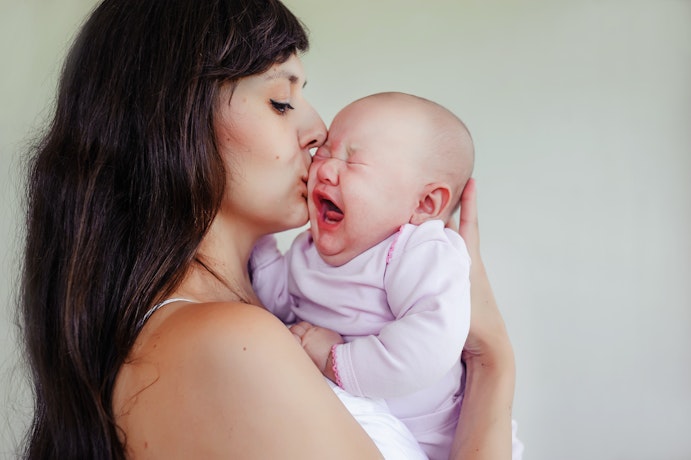
A Baby’s Cry and the Effects on Mother
Have you ever been advised to let your child cry?

Have you ever been advised to let your child cry?
Crying ruffles us.
Hearing a baby cry activates a physiological response that cannot be controlled. MRIs taken of a mother’s brain when she hears her baby’s cries show that the brain lights up in response within a second. Those areas that light up are associated with empathy, compassion, and notably alarm. But what effect does a baby crying have on their mother?
Science tells us that oxytocin plays a major role in our mothering. Oxytocin is a nano peptide hormone produced by the posterior lobe of the pituitary gland. It is often referred to as the “love hormone” or “cuddle hormone” because it is released when individuals cuddle up or bond socially. It is released in large quantities during labor as it is associated with uterine contraction. It is also released during breastfeeding and when you cuddle your baby. As you might imagine, mothers produce a lot of oxytocin, and research has shown that oxytocin makes us more sensitive to our baby’s cries.
The response time to a crying baby is almost twice as fast as most other sounds. Because the instinct is so strong to respond, when a mother cannot reach her baby and calm the crying in a matter of seconds, she may begin to feel frustration and even anger. This is why hearing children cry on a plane or in restaurants is so triggering. When we hear it and cannot respond, there is a physiological response.
However, when we are able to calm and comfort the baby, our own reward and pleasure areas light up. Our brain physically rewards the act of comforting and caring for a child. Pretty cool design, huh?
And it doesn’t even have to be your baby. Hearing any baby cry will make your brain look like Christmas. It seems we are hardwired from birth for this to be a trigger meant to make us act quickly, and it’s very effective in its design.
When Parenting Advice Goes Against Instinct
Have you ever been advised to let your child cry? I think most of us have. Whether it's to “sleep train” or to “ignore a tantrum” so as not to “reinforce bad behavior,” I believe most of us are told to do this at some point in our parenting journeys, and many of us do.
My boys were terrible sleepers. Desperate from sleep deprivation, I tried a modified version where I inched my chair away from the toddler bed ever so slowly. When I finally made it out of the room, I would wait for just a couple of minutes before answering their disgruntled protests, which didn’t even escalate into cries because I couldn’t stand to ignore my instinct. However, in that state of being so physically and mentally exhausted, I was tempted to let them cry. I could see why mothers would, and my logical brain tried to talk me into what the heart knew I couldn’t do.
In the end, I never did any kind of cry-it-out or controlled crying, but I certainly have compassion for mothers who did. And while I don’t condone it, I can understand it. The point is, though, that it is very difficult for the mother to ignore that strong instinct to move. Every cell in her screams to respond, and panic lights up in her brain. I won’t even get into how it affects the baby’s brain. A quick Google search will offer you a rabbit hole to go down for days, and you can draw your own conclusions.
The suggestions to let my kids cry never really ended. I was told to ignore them when they had a tantrum. I was warned to not comfort boys too much because they needed to be “tough.” I was told not to reinforce the behavior of the “drama king or queen” teen who is crying “over nothing.” All throughout parenthood, I’ve been advised to ignore the physiological response within me triggering me to act. Time and again, I have ignored that advice.
Crying is Communication
To me, crying has always been communication. And I always attempt to listen. And while the whining of a toddler or teenager may be grating on the nerves, it is a desperate attempt at communicating what’s going on internally for them.
SnuggleBuddies® Teach Babies and Tots About Emotions
Unfortunately, we get caught up in thinking that there are only two alternatives - giving in or ignoring, but there is a third option - holding boundaries with empathy. While we have been led to believe that a toddler is crying to manipulate you, we now know that it is really just an offload of an overwhelmed nervous system.
Comforting him won’t make him want to have more meltdowns because meltdowns don’t feel good for anyone. Ignoring only alarms the brain more. Loving arms and a listening ear will make their world right again.
If a preschooler is demanding a cookie for breakfast and your denial of that cookie causes tears, you don’t have to give the cookie or ignore the cries. The “boundaries with empathy” option allows you to say, “I see that you are upset about the cookie.
That is not a healthy breakfast and I want you to be healthy because I love you very much.” She wants her feelings to be validated more than she really wants the cookie.
The same holds true for the pouty pre-teen who is upset you won’t buy him a new video game or the teenager who doesn’t get to go to that party. Shutting down their tears and whining doesn’t resolve their feelings, but instead causes alarm and resentment, but listening, validating, and comforting when they will allow it shows that, while they may not get their way, you are always on their side.
FAQ
Why Do Babies Calm Down with Mom?
From the moment a baby is born, they recognize their mother's scent, voice, and touch. This recognition is rooted in the nine months they spent in the womb, surrounded by the rhythmic sound of her heartbeat and the muffled tone of her voice. The maternal figure often becomes a source of comfort and security for a newborn. Babies have an inherent instinct to seek out their primary caregiver – often the mother – when they're upset or in distress. This is because a mother's touch, voice, and even her presence can release calming hormones in the baby, making them feel safe and understood.
Why Does My Baby Cry with Me but No One Else?
It might seem puzzling and even disheartening when a baby cries with their primary caregiver but seems perfectly content with others. However, there are several reasons behind this behavior. Firstly, babies often reserve their most intense feelings – both positive and negative – for those they are closest to. With a primary caregiver, a baby feels secure enough to express their genuine feelings without the fear of abandonment. Additionally, babies can pick up on their caregivers' stress or anxiety. If a parent is anxious or stressed, a baby might respond by becoming fussy or crying. Lastly, babies have different expectations from their primary caregiver compared to others. They might cry to communicate a need or desire, knowing that their primary caregiver understands them best.
Share





